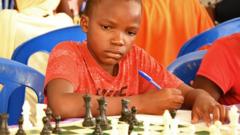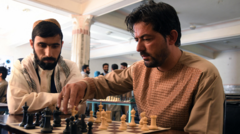In the impoverished neighborhood of Katwe, Robert Katende has been dedicated to changing the lives of local children through chess for over two decades. The SomChess Academy, immortalized by the 2016 Disney film "Queen of Katwe," remains a beacon of hope, producing champions amidst persistent financial challenges. Initially a football coach, Katende transitioned to chess in 2004, motivated by the desire to empower the youth with skills that extend beyond the game. His efforts brought extraordinary talent to light, exemplified by Phiona Mutesi, a girl who rose to international fame as a chess prodigy, inspiring countless others along the way.
With more than 4,000 children having passed through his programs, the impact of chess reaches beyond competitions, fostering discipline and strategic thinking among players. Many have gone on to achieve academic success and professional careers. Although Katende received initial funding support after Mutesi's story gained fame, financial strains intensified following the pandemic, leading to reduced operations and staffing. Katende’s chess initiative, which has expanded internationally, now faces tougher competition for limited resources, with players like Jovan Kasozi missing critical opportunities due to lack of funding.
Despite the setbacks, Katende remains optimistic about the potential for future support, reflecting on the broader lessons chess imparts about life’s challenges and opportunities. As the academy holds onto the hope of revitalization, it remains a testament to the power of perseverance and the enduring spirit of those it serves.
With more than 4,000 children having passed through his programs, the impact of chess reaches beyond competitions, fostering discipline and strategic thinking among players. Many have gone on to achieve academic success and professional careers. Although Katende received initial funding support after Mutesi's story gained fame, financial strains intensified following the pandemic, leading to reduced operations and staffing. Katende’s chess initiative, which has expanded internationally, now faces tougher competition for limited resources, with players like Jovan Kasozi missing critical opportunities due to lack of funding.
Despite the setbacks, Katende remains optimistic about the potential for future support, reflecting on the broader lessons chess imparts about life’s challenges and opportunities. As the academy holds onto the hope of revitalization, it remains a testament to the power of perseverance and the enduring spirit of those it serves.



















